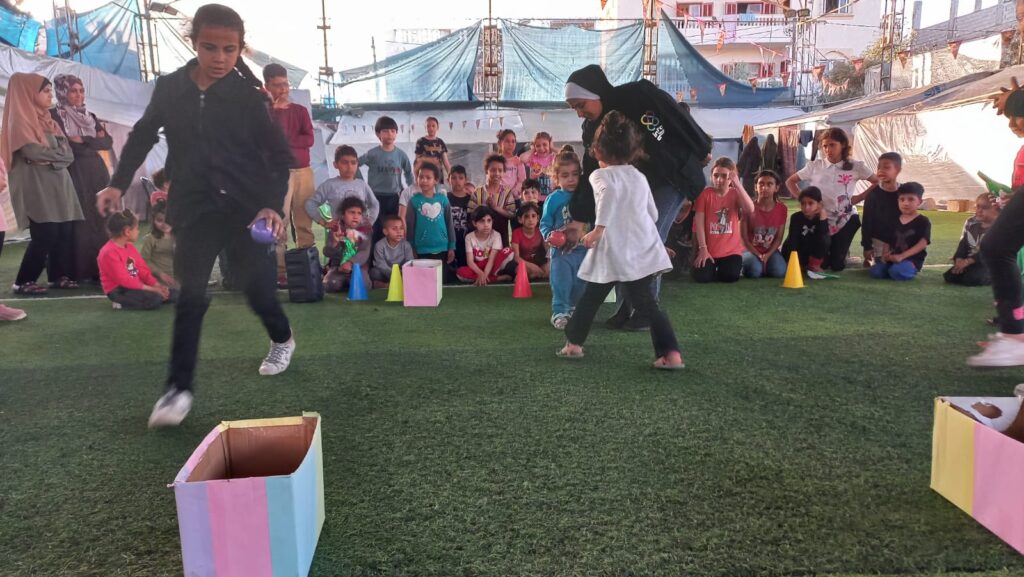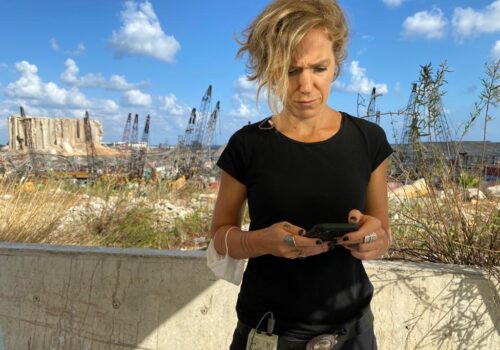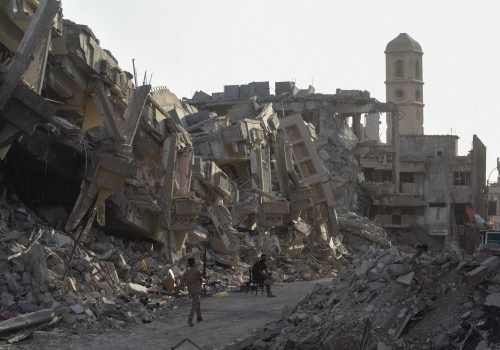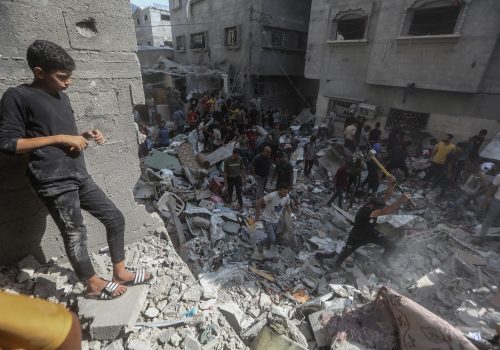Dispatch from Gaza: ‘My son, every night he screams and convulses’
It’s a crucible of human misery, this tented existence that spills out of shelters, blankets sidewalks, and covers any inch of empty space in Rafah in the southern Gaza Strip.
“They’ve reduced us to the way the world wants to see us,” one of my Gazan companions comments to me. “Miserable, begging, and in tents.”
This is madness, I think to myself, staring out the car window. We’re barely moving every few minutes through this crush of people, donkey carts, and aid trucks. Ambulance sirens wail, drones buzz above head, and people yell and shout.
It’s the beginning of April, six months into the Gaza war. Rafah’s population has swelled from around 275,000 to, by some estimates, 1.4 million as Gazans were forced to flee their homes in other parts of the strip.
I lock eyes with those of a mother, her infant passed out on her shoulder. She gives me a weak smile. I see two teenage girls hanging off the back of a donkey cart, giggling at each other, and I am relieved—relieved that I caught that moment in the middle of this sea of human sorrow. People look like ghosts but are haunted by all those they have lost.
It’s nearing the end of the holy month of Ramadan, during which Muslims around the world fast from sunrise to sundown. Iftar meals traditionally bring families and friends together to break their fast.
SIGN UP FOR THIS WEEK IN THE MIDEAST NEWSLETTER
All I can think about is the impending Rafah invasion, which Israeli Prime Minister Benjamin Netanyahu has said he has set a date for. The possible invasion has been the largest bone of contention between Israel and its long-standing ally, the United States, which has been “urging” Israel not to proceed. It’s an alliance that no one here can understand. How can the United States continue to support and fund this?
I imagine a bomb falling on these souls, and a part of me wonders in horror if I’m just staring at the already condemned. My heart starts pounding when we’re stuck behind an ambulance—as ambulances have been targeted by the Israel Defense Forces (IDF).
There are no proper toilets, showers, or sanitation, and there is no proper access to clean water. I drive past a cluster of people—young and old—surrounding a water truck, carrying beaten-up gallon bottles, pots, and whatever they have managed to scrounge to fill up with water.
Some stalls in the street sell produce from aid parcels. I’ve seen this in other war zones as well. A family that needs baby powder will barter the lentils and canned beans from their food parcel. They don’t have a choice because their babies need diapers, women need sanitary pads, and people will scrimp on any volume of food to be able to supplement a meal with a couple of wilted vegetables. They don’t have money, and there is no way to make money, so they barter what they are given for a more pressing need.
There is neither enough aid getting through nor enough commercial trucks, and as a result, what is available on the market is grossly overpriced. As of April 12, according to the United Nations Relief and Works Agency for Palestine Refugees in the Near East (UNRWA), around 20,500 trucks have made it into Gaza during the last six months. Pre-October 7, 2023, Gaza saw around 500 trucks a day enter, which means that Gazans needed roughly 90,000 trucks over the past six months.
Addressing this level of desperation is about so much more than just counting trucks that have made it across the border. Aid must get to a warehouse and then move to the needy population.
Humanitarian aid moves through a warzone in what’s known as “deconfliction,” whereby warring parties are informed of and, in theory, agree to specific routes and locations. It’s a process that has never really worked in this wretched battlespace. Convoys are regularly denied movement requests by the Israeli side, and even when those requests are granted, any movement is fraught with dangers.
The starkest and most recent reminder of that is the April 1 Israeli airstrike on a convoy from the World Central Kitchen (WCK), an organization that I would argue had the best lines of communication to the Israeli side, the best “deconfliction.” WCK has since suspended its operations, as did a handful of other organizations.
Two days after the WCK hit, I arrived in the Gaza Strip on a humanitarian mission for my charity, the International Network for Aid, Relief & Assistance (INARA). Fellow humanitarian workers and volunteers I chatted with on the way in were all anxious—myself included. If WCK could lose people like this, what did it mean for the rest of us?
INARA works with thirteen informal shelters and has a Gazan team. We discussed pausing our work and whether the team felt safe enough to continue.
“We can be hit at any time. It’s always a risk,” Mona, one of our lead team members, whose full name is being withheld for safety reasons, explains to me. “If we don’t do this for our people, our people’s children, then who will? We have to stay strong. We have to keep going.”
Our team arrives at one of the shelters we work with north of Rafah. The children swarm around Mona; she’s a familiar face here, and they know that this Gazan woman in her thirties brings a break from their monotonous existence. They all clamor to help her set up the speakers, hula-hoops, balls, and other games. I play and dance with the children. I even smile and laugh, but my heart breaks into a million pieces.

That evening, at the breaking of the fast meal known as iftar, we hand out hot meals INARA purchased from a local makeshift community kitchen set out of a former car repair shop. We splurged to provide Palestinian chicken mandi, a specially spiced dish that is cooked for hours in a pit underground. It’s a taste of the past, before October 7, a time when parents could afford to feed their children something like chicken. For months, one could rarely find chicken or meat on the market in Gaza. Over the last few weeks, supply has increased, but the vast majority of Gazans, with no income, still cannot afford it.
“Thank you. We used to get hot meals from WCK, but it’s been a few days, and nothing has arrived,” one of the older men says to me.
A few weeks ago, we managed to find solar panels locally and install them at one shelter. Now, children can play at night and go to the toilet—two for two hundred people—without being as afraid as they were before. There is no electricity in Gaza, and generator fuel is astronomically priced. Solar panels are a solid option, but trucks carrying them have been rejected entry since the war began.
A woman comes to plead with me, her daughter in tow: “We are thankful, but please, can you get her out? She had a scholarship to study in Turkey.”
Another mother begs, “Please help us! What has this government [Hamas] done for us? I don’t care; they just need to end this.”
But I can’t get them out, and I can’t end this. What I can do just feels so small, and my heart aches for every single one of them.
That night, I crashed at Mona’s place with her family. No one moves at night; it’s too risky, with Israel’s reported use of artificial intelligence to determine targets and the seeming randomness of what is being hit. Her elderly mother asks if I think the Rafah invasion will happen and where they are supposed to go. I don’t know how to answer that. She asks when I think it will end. I don’t know how to answer that, either.
“Stay with us,” Mona’s mother jokes. An explosion shakes the windows, drones buzz overhead, and she grips the armchair. I notice that her hands are trembling.
Mona and I “girl talk” in her room. I’m in a pair of borrowed sparkly pink pajamas, and she’s telling me about how, war or no war, she must be elegant when she goes out. Mona shows me some of her sister’s clothes that she wears all the time to feel closer to her.
Mona’s sister managed to get out to Egypt along with her young children early on in this war. She gave me a couple of bags of medicine, dried fruit, and other goodies to carry into Gaza for her family inside. The family wants to share what they have just received. I gently refuse, saying there is plenty for me when I go home, that I’m not hungry. But this level of generosity just hurts the soul.
If only the rest of the world could see this level of kindheartedness—could just be here in this moment, I think to myself. I wonder if I were subjected to such circumstances, would I be able to hold on to my humanity like this?
Just as I am about to fall asleep, another explosion jolts me off my mattress. I am here but don’t understand how anyone copes with this. This constant web of anxiety that settles in your chest.
The next morning, Mona and I head to Mawasi, the southernmost part of Gaza’s beachfront. Here, families used to picnic, and children screamed and played. We drive past Mona’s favorite fish restaurant, where she used to walk and work out with friends.
“I can’t believe what I am seeing,” she turns to me. “I just can’t believe this. This can’t be real.”
We meet up with two doctors to set up medical points and address some of the basic medical needs of the population. Gaza’s medical infrastructure has been decimated; hospitals cannot handle the influx of the injured, never mind the ill. There is a massive spread of communicable diseases, from diarrhea to hepatitis A, and there are infected wounds. There is someone who needs medical attention in just about every tent.
With each step in one tent, my foot sends a swarm of flies in the air. A mother shoves her listless baby at one of the doctors accompanying us. He’s severely malnourished.
Mothers are not getting enough food and nutrients to produce breast milk, there isn’t enough baby formula to supplement, and finding clean water to mix it with is yet another challenge.
United Nations agencies have warned of the risk of famine since December 2023. In northern Gaza, where the humanitarian situation is significantly more catastrophic, more than two dozen children are reported to have died from malnutrition and dehydration.
We talk about the need for hygiene kits and sanitary reusable underwear, and the need to distribute those items at Rafah and Mawasi. We try to plan around the unknowns: whether Rafah will be bombed, where everyone will go, what will happen to all the aid warehouses, and what access people will have to aid if Rafah is invaded.
It’s utterly overwhelming. The sort of overwhelming that twists your guts and sits in your chest. Later that day, a mother—hearing that we work on mental health with children—comes up, grabbing my arm.
“Please, my son, every night he screams and convulses,” she tells me. “It started when he saw his sister’s head blown off in an explosion that hit our house.”
My mouth dries. I stare at this mother talking about her son and her daughter’s awful death. Her voice is even-keeled as if it was just a story she was telling nonchalantly. I wonder if it’s because she’s been through so much that she’s lost all ability to process it. But then again, how does one process that?
“May she rest in peace, may God give you strength,” I say, my voice a whisper, barely able to form the words.
Arwa Damon is a nonresident senior fellow at the Atlantic Council’s Rafik Hariri Center for the Middle East and president and founder of the International Network for Aid, Relief, and Assistance (INARA), a nonprofit organization that focuses on building a network of logistical support and medical care to help children who need life-saving or life-altering medical treatment in war-torn nations.
Further reading
Fri, Mar 8, 2024
Journalist Arwa Damon on conflict reporting: ‘You will leave a part of yourself behind’
MENASource By Holly Dagres
The multi-award-winning journalist was interviewed by our MENASource editor to discuss her recent projects, mental health in journalism, and the importance of effective storytelling.
Wed, Nov 15, 2023
I covered the battle against ISIS in Mosul. Gaza’s challenges will make it look like child’s play.
MENASource By Arwa Damon
If there is something to be drawn from those lessons, it is that what Israel is doing right now will secure anything but peace and stability.
Tue, Oct 24, 2023
I spent two decades as a CNN correspondent. We journalists need to do a better job reporting the truth.
MENASource By Arwa Damon
The media needs to realize and recognize the role we can play in fueling polarization and hate.
Image: Palestinian children play amid the rubble at a park destroyed during Israel's military offensive, during Eid al-Fitr, amid the ongoing conflict between Israel and the Palestinian Islamist group Hamas, in Gaza City April 11, 2024. REUTERS/Mahmoud Issa


